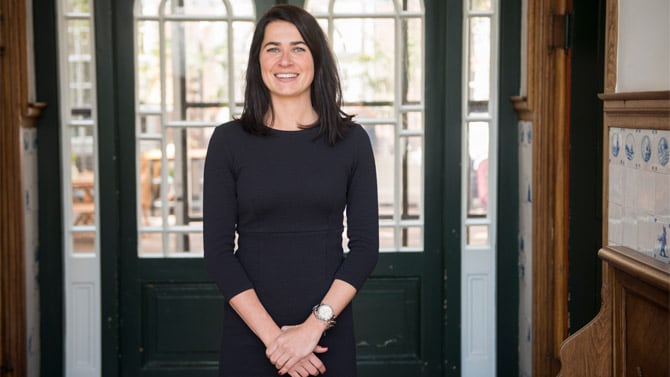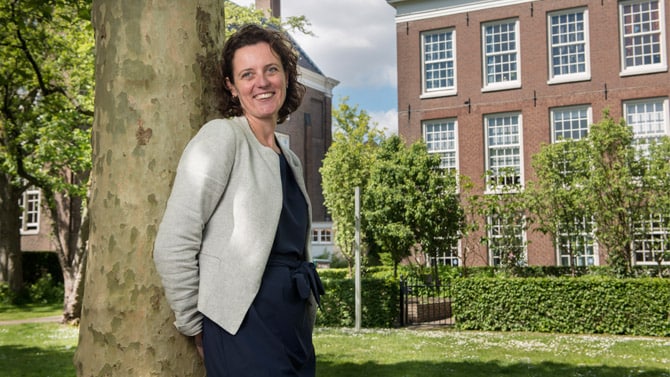
The Social Approach to Dementia
How do you stay “part of things” when you have dementia? And how do you and those around you cope with all the constantly changing possibilities and limitations? Until recently, we viewed these questions mainly from a medical and care perspective. However, the Social Approach to Dementia shifts the focus from the condition itself to the everyday environment of the person with dementia and those around them. Over the next four years, eight Social Approach Trials are intended to lead to new national standards that guarantee improved quality of life at lower cost.
Tension between the everyday environment and the system
“For me, the Social Approach to Dementia is more than just a project,” says initiator Anne-Mei The, founder of Tao of Care – a research, consultancy, and training agency for care and social issues – and endowed professor of Long-term Care and Dementia at the University of Amsterdam. “It represents a hopeful emancipation movement to make the voices of vulnerable people heard and to let them express for themselves what it is that’s so incredibly complicated in their lives. For far too long we’ve talked about these people instead of with them. In doing so, we weren’t just failing them; we also weren’t providing them with hopeful solutions for improving their quality of life. We now want to change all that and work towards new national standards for people with dementia and those around them.”

“For me, the Social Approach to Dementia is more than just a project. It represents a hopeful emancipation movement to make the voices of vulnerable people heard and to let them express for themselves what it is that’s so incredibly complicated in their lives. For far too long we’ve talked about these people instead of with them."
Years of anthropological research
The Social Approach to Dementia is the result of years of anthropological research into the everyday environment of dementia sufferers and those around them. Their accounts lead to patterns, insights, and structural support solutions that balance the medical, psychological, and social domains. Prof. The explains: “When I researched nursing-home care back in about 2000, I was working in the field of palliative care, in oncology. That brought me into contact with the phenomenon of dementia – which wasn’t really a social issue yet back then. But while carrying out my study I realised that the way care was provided wasn’t right. The prevailing way of describing dementia was in terms such as dehumanisation, mental incapacity, nursing homes, the final phase of life... My 2005 book about it – In de wachtkamer van de dood [In the Waiting Room for Death] – generated a lot of publicity and instantly turned me into an expert on nursing homes and therefore on dementia. That brought me into contact with dementia sufferers who were living at home and with people who had partners with dementia. So that was a different world to that of nursing homes, and one that we didn’t really know much about. It’s a world of nice friendly people, where dementia arrives, disrupts ordinary life, and slowly makes things unbearable. For by far most of the time that people have dementia, they simply continue to live at home. That may well mean ten years, but actually very little attention is paid to that.”
A new perspective for carers
Rosanne Lucas – involved in the Social Approach to Dementia as manager of PwC’s consultancy practice – nods in agreement: “My mother has had Alzheimer’s disease for seven years now, and she recently went into a nursing home as a crisis admission. So I’ve followed the process from up close. There were things that made me think ‘Why do we do it this way?’ Some healthcare professionals didn’t see what our real needs were and weren’t concerned with what was important – for us. When there’s someone with dementia in your family, your world becomes a very small one. Visits from family and friends became less and less frequent. They didn’t know how to deal with my mother’s deterioration. That’s difficult, painful, and sad. At a certain point there were just the four of us left: my mother, my father, my brother, and me. A lonely existence, for which the current system of support doesn’t always have an answer. The Social Approach to Dementia focuses on strengthening the network and discussing these difficult topics together. That way, you can talk about the issues that make you sad or lonely, so that you don’t have to struggle separately and alone but are helped to discuss things with one another. If the support had focused more on strengthening the network, my mother would have been more comfortable living at home for longer and we would have been able to avoid the crisis admission.”
Trials with the new approach in Friesland
“What people with dementia need is a single line of support from the very beginning until even after their death,” says Anne-Mei The at Amsterdam’s House of Time, a place where everyone involved with dementia can meet and learn from one another. “There’s a need for someone who accompanies you through that unknown landscape, guides you through it, advises you, but is sometimes also simply there to help you with purely practical things, such as going to the nursing home, or staying for a while even after you’ve died so as to help your loved ones get back on their feet. In Friesland – where we took the first steps towards a social approach with a dementia care trial in 2015 – we called that person ‘the guide’. He or she is a case manager with a broader perspective, a different attitude, and more time and involvement during all stages of the condition – a kind of all-rounder. A person like that really helped, but during the trial we also came to realise that an all-rounder like that couldn’t really be just a single person. What we actually needed to do was set up all-round teams, with different features represented by different people: a confidential advisor, a buddy, someone who knows a lot about family relationships, and so forth. What we also noticed during the trial was that we could quite easily do some very good things to improve the lives of people with dementia. But there wasn’t enough funding and it was all non-committal and dependent on good intentions and subsidies. When the money ran out, the trial came to an end. And anyway, change is incredibly difficult. Care professionals who had to tackle things differently felt they were under attack. At that point I realised that what really matters is implementing behavioural change at various different levels. You can’t just quickly do that in the form of a project; it takes an awful lot of time.”

“My mother has had Alzheimer’s disease for seven years now, and she recently went into a nursing home as a crisis admission. So I’ve followed the process from up close. There were things that made me think ‘Why do we do it this way?’ Some healthcare professionals didn’t see what our real needs were and weren’t concerned with what was important – for us. The Social Approach to Dementia focuses on strengthening the network and discussing these difficult topics together. That way, you can talk about the issues that make you sad or lonely, so that you don’t have to struggle separately and alone but are helped to discuss things with one another."

Amsterdam’s House of Time, a place where everyone involved with dementia can meet and learn from one another.
Political support for Social Approach Trials
Anne-Mei The decided to write another book – Dagelijks leven met dementie: een blik achter de voordeur [Daily Life with Dementia: a Look behind the Front Door] – with an urgent appeal to politicians. She presented the book to Hugo de Jonge, the Minister of Health, Welfare and Sport, asking him to help her bring about improvements in support for dementia sufferers and those around them. She was also approached by a number of members of the Dutch House of Representatives who had read about her in the press and seen her on TV. She asked them: “Help me to get the system on the agenda and to make sure that the trials I’m aiming for can be set up on a small scale nationally. Then we can really make a difference.” Three Members of Parliament – Vera Bergkamp (D66), Corinne Ellemeet (GroenLinks),and Carla Dik-Faber (Christienunie) – submitted a motion which was adopted by the whole House on 14 December 2017 and that made the Social Approach Trials possible.
A new dementia ecosystem
In order to actually change sufferers’ everyday environment and the system, Anne-Mei sought the help of PwC, after which a programmed, integrated approach was developed on the basis of existing pilots in hospitals, mental healthcare, and geriatric care organisations. The success of the approach will need to be demonstrated by developing and implementing specific initiatives, adjusting internal management, connecting up parties and financiers, and monitoring and evaluating the entire process. “With these Social Approach Trials, we are working towards new national standards for dementia sufferers and those around them,” says Willeke Bakker, director of the consultancy practice at PwC. “That means you’ll have to take account of the entire ecosystem surrounding these people. That makes it one of the most complex changes we are trying to achieve in healthcare. We need to deal with the Ministry of Health, Welfare and Sport, municipalities, care administration offices, healthcare insurers, healthcare providers, welfare organisations, GPs, and a multitude of sector and interest groups. If we’re to make it happen, we need all of them to be involved. We’ve already started and we’re very enthusiastic about the initial effects of the Social Approach Trials, both in the everyday environment and in the system. The trick is not to just tinker with the existing arrangements but to work with healthcare professionals towards a fundamental redesign of the national arrangements on the basis of the Social Approach to Dementia.”
Budget shift required
Rosanne Lucas adds that “The multiplicity of stakeholders makes this a complicated matter. But the partitions between the parties involved are even more complicated. Whether it’s the municipality, the insurer or the healthcare agency, they all reason from their own perspective and often from their own interests. Indeed, one important aspect of the Social Approach Trials is to connect up the various different stakeholders. That’s because it really is about a shared vision that you believe in, and which you know demands that you cooperate with one another. Our approach envisages savings that will allow dementia sufferers to be admitted to a nursing home at a later stage of the condition and will reduce consumption of care. But what makes things difficult is that the costs precede the benefits and also that the investor, often the municipality, is not the same as the parties that reap the benefits, often the healthcare administration offices and the healthcare insurers. To create the desired win-win situation of improved quality of life at lower cost, it’s necessary to ensure innovation and shift budgets so that you invest in the right places and the profits you make flow back into the system in the right way.”

"In the Social Approach to Dementia we work from the perspective of the dementia sufferers themselves. We focus on what dementia means in their daily life and what they – and we – can do to help them pick up the thread of normal life again. Putting the focus on the people with dementia may sound easy, but the feeling that they aren’t really human any more or are different, or that they no longer count, is often still deeply rooted in us."
Putting the focus on the people with dementia
“Achieving that is tougher than it may look at first glance,” adds Anne-Mei The. “Don’t forget that change hurts a lot anyway. You’re now suddenly asking healthcare professionals – who are proud of their profession and have always worked in a certain way – to adopt a broader view by not, for example, thinking in terms of phases of illness and symptoms but looking at matters from the point of view of people and their needs. That involves interpreting things very differently. And yes, it does hurt when the way you’ve always worked suddenly has to change. People often feel criticised personally, and they respond with a lot of emotion and sometimes also with anger. In the Social Approach to Dementia we work from the perspective of the dementia sufferers themselves. We focus on what dementia means in their daily life and what they – and we – can do to help them pick up the thread of normal life again.
Putting the focus on the people with dementia may sound easy, but the feeling that they aren’t really human any more or are different, or that they no longer count, is often still deeply rooted in us. I recently caught myself thinking that way. Our trial in Amsterdam includes a copywriter, an adman, who’s had dementia for a number of years. He recently commented to me: ‘You’re doing really great things, but your marketing is terrible. You need to publicise things more and get your story out. I’d like to help you with that – because it’s my job – but I won’t do it for free.’ All very nice of course, but when he started talking about money, I thought that if someone had to pay something, it should be him rather than us because we’re the ones doing the trial. I then felt really ashamed of myself for thinking that way because I seemingly thought that someone with dementia would no longer be able to provide a paid service. When I talked to him again I told him: ‘You’re too expensive for me, but I’ve heard you don’t have any office space; would you like to join us in our office?’ That way we can help one another.”
Succesful Social Approach Trials
Besides in Amsterdam, trials are already ongoing in Amstelveen, ’s‑Hertogenbosch and Rotterdam, and we’re also talking to parties in Landgraaf, Roermond, and Salland. The, Bakker, and Lucas have found a common commitment and enthusiasm for the approach in all the various regions. Looking ahead, Anne-Mei The says “If in four years’ time we can respond to the needs of people with dementia and those around them, so that we can alleviate the suffering hidden behind their front door, then the Social Approach to Dementia will have succeeded. By closing the gap between supply and demand, we ensure that people with dementia can continue to live at home more easily and for longer, so that ultimately an improved quality of life leads to lower costs. Our social approach teams are based on that concept, and are surrounded by a number of concentric ‘shells’ made up of students, volunteers, refugees with a residence permit, and people with poor job prospects – in fact, all the potential that Dutch society has to offer. In this way we aren’t just helping the ever-growing group of dementia sufferers but are also doing something about the shortage of healthcare personnel on the labour market.” And the new approach hasn’t gone unnoticed. “We are already getting a lot of enquiries that make clear that this social approach is relevant right across the healthcare sector,” says Willeke Bakker. “For the time being, we’re focusing on ensuring that dementia interventions are implemented in all the regions. In the longer term, our approach to healthcare provision can extend beyond dementia and can serve as a blueprint for cross-domain care and support.”

“We are already getting a lot of enquiries that make clear that this social approach is relevant right across the healthcare sector. For the time being, we’re focusing on ensuring that dementia interventions are implemented in all the regions. In the longer term, our approach to healthcare provision can extend beyond dementia and can serve as a blueprint for cross-domain care and support.”
Contact us

Partner, Consulting Lead, Ministerie van Volksgezondheid, Welzijn en Sport, PwC Netherlands
Tel: +31 (0)61 089 31 82

















